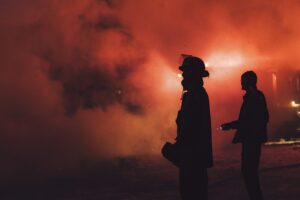Cllr Tom Hunt, the leader of Sheffield City Council, has written to the Secretary of State for the Environment, Steve Barclay asking for a ban on the practice of burning on the moors around the city.
The practice of burning moorland exists for the benefit of grouse shooters. Burning the heather down produces younger roots which are more palatable to grouse and has the additional ‘benefit’ of reducing cover for those creatures that prey on the grouse.
The moors around Sheffield that are not owned by the council (who have banned burns on their land) are regularly burned and in October of this year, many felt enough was enough.
In a blog by conservation campaigner Bob Berzins, 9th October 2023 was referred to as ‘The day Sheffield filled with smoke’.
The University of Sheffield studied what happened that day and published their results as: ‘Impact of Moorland Fires on Sheffield Air Quality on 9th October 2023’.
There are four grouse moors to the west of Sheffield and, that day, all of them were burning heather. The wind pushed smoke directly across the city and the Defra and Council monitors measured it: ‘The maximum value recorded at Devonshire Green was the highest for 8 months while the single largest reading (66 µg m³) was observed at Lowfield Primary School. Young children are particularly vulnerable to poor AQ and were exposed to high levels for several hours. Other sensors across the western side of Sheffield also recorded very high PM2.5, exceeding 50 µg m³ in many regions.’
Announcing that he was asking for a ban on heather burning, Tom Hunt said ‘Moorland burning does huge damage to our uplands. It destroys biodiversity, increases flood risk and reduces air quality. Air pollution kills. Fires have an immediate impact on hospital admissions and A&E attendances.’
Below is his letter in full:
Dear Minister
I am writing to you about moorland burning and to call on your government to end this damaging practice.
‘The rotational burning of heather moorland by landowners in the Peak District national park is an annual occurrence. Every year Sheffield City Council receives many complaints from members of the public about the impact it has on them. Often, residents call on the council to put a stop to this practice. As you know, the council has limited to no powers to compel landowners to behave responsibly.
Despite our limited powers, we are doing our part to stop moorland burning. Since 2016, Sheffield City Council has prohibited burning on the moorland that it owns. The Council owns Hathersage, Houndkirk and Burbage Moors, bits of the Eastern Moors, and Blackamoor. We are working with other land managers to promote sustainable land management practices and urge adjacent landowners to follow our lead and introduce a ‘non-burning’ policy in favour of more sustainable management practices. We are also currently exploring the option of issuing an abatement order against landowners.
We are members of Sheffield Moors Partnership, Eastern Moor Partnership and Moors for the Future which promote sustainable management of the moors and nature conservation; climate change mitigation; flood management; and clean water. We also work with bodies such as the Peak District National Park, The National Trust, the Royal Society for the Protection of Birds and Sheffield and Rotherham Wildlife Trust. They are our tenants and manage the moors on our behalf.
We know that heather burning is currently a legal activity. Under legislation introduced in 2021, vegetation burning in protected sites (such as SSSIs) and on areas of deep peat over 40cm may only be undertaken with a licence. Sheffield City Council is clear that burning on blanket bog (internationally significant moorland habitat comprising deep peat) is detrimental to biodiversity, peat formation, water quality and carbon storage. The moors surrounding Sheffield and across swathes of the Pennines are internationally important for their biodiversity and need protection. There is no argument for burning on grounds of biodiversity gain that is based on science. We cannot see any rationale for this activity. In 2020, the Committee on Climate Change, the independent, statutory body established under the Climate Change Act 2008, called for an end to rotational burning.
The government has mandated many cities, Sheffield included, to take significant action to improve air quality. We are taking this action. We all know that air pollution kills and that air pollution from fires has an immediate impact on hospital admissions and A&E attendances. We have had reports from people with asthma and breathing difficulties whose condition is made worse by moorland burning. We all know that the real impact of air pollution is in heart attacks and strokes, and increasingly lung cancer is linked to air pollution. The burning of heather, simply speaking, makes it harder for Sheffield to achieve its air quality improvement ambitions, its climate and net zero ambitions.
Moorland burning also increases flood risk by reducing the amount of vegetation on our uplands. Only a few weeks ago, in October, we saw significant flooding in parts of South Yorkshire and Derbyshire, as well as across the UK, caused by Storm Babet. Measures to hold more water high up in our river catchment systems, and to slow the flow of water into our rivers, are essential for our communities and for biodiversity. The less vegetation there is on our moors, the quicker the runoff of water.
Sheffield City Council is taking the steps it can, to tackle moorland burning. I hope you will take action to end this destructive practice and to put pressure on landowners to put an immediate end to it this season.’
Yours sincerely
Councillor Tom Hunt
Leader of Sheffield City Council

















Thank you very much for this. Countryside burning and the pollution it causes is so often forgotten or excused.